论商务英语词汇的特点及其翻译方法
商务英语的特点及翻译技巧

商务英语的特点及翻译技巧商务英语是一门应用型英语,其特点是实用性强、专业性强、精确性要求高。
商务英语的主要用途是在商业交流中进行信息的传递和沟通,因此其特点决定了其翻译需要具备一定的专业知识和技巧。
一、商务英语的特点1.实用性强:商务英语着重于应用,主要目的是为了满足商业场景下的沟通需求。
因此,商务英语注重实际应用,帮助人们进行有效的商务交流。
2.专业性强:商务英语的语言内容和技巧要求与特定的商务领域息息相关,因此需要对相关的商务知识和行业背景有一定了解,才能准确理解和翻译商务英语文本。
3.精确性要求高:商务英语的交流目的是为了准确传达信息和达成协议,所以对词汇的准确性和语法的正确性有较高的要求。
翻译商务英语时,也需要追求精确表达,避免歧义和误解。
二、商务英语翻译技巧1.深入了解商务背景:在进行商务英语翻译时,首先要对相关的商务领域和背景有一定了解,包括相应的行业术语、商务惯例和文化背景等。
这有助于准确理解和传达商务信息。
2.注重文化适应性:商务英语翻译需要考虑到不同国家和地区的文化差异。
在进行翻译时,要注意避免直译和文化冲突,选择适当的表达方式,以便更好地融入目标文化。
3.简洁明了:商务英语的目的是准确传达信息,因此要以简洁明了的语言表达,并避免复杂的句式和词汇。
翻译时也要遵循这一原则,尽量使用简洁的方式翻译商务英语文本。
4.准确性优先:商务英语对准确性要求高,因此在翻译时要注重准确表达。
避免直译、歧义和误解,保证翻译的准确性,以便确保信息的传递和商务交流的有效性。
总结起来,商务英语是一门实用性强、专业性强、精确性要求高的英语。
翻译商务英语需要具备一定的专业知识和技巧,并注重文化适应性、简洁明了和准确性优先。
翻译者应该深入了解商务背景,尽可能准确地传达商务信息,以达到有效沟通的目的。
商务英语的语言特点及翻译技巧
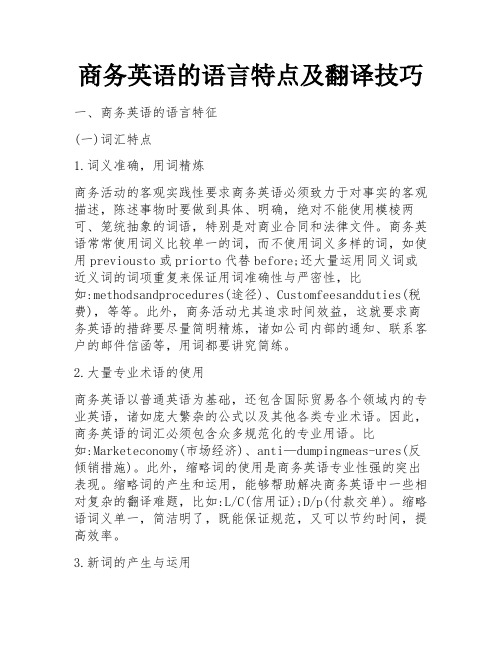
商务英语的语言特点及翻译技巧一、商务英语的语言特征(一)词汇特点1.词义准确,用词精炼商务活动的客观实践性要求商务英语必须致力于对事实的客观描述,陈述事物时要做到具体、明确,绝对不能使用模棱两可、笼统抽象的词语,特别是对商业合同和法律文件。
商务英语常常使用词义比较单一的词,而不使用词义多样的词,如使用previousto或priorto代替before;还大量运用同义词或近义词的词项重复来保证用词准确性与严密性,比如:methodsandprocedures(途径)、Customfeesandduties(税费),等等。
此外,商务活动尤其追求时间效益,这就要求商务英语的措辞要尽量简明精炼,诸如公司内部的通知、联系客户的邮件信函等,用词都要讲究简练。
2.大量专业术语的使用商务英语以普通英语为基础,还包含国际贸易各个领域内的专业英语,诸如庞大繁杂的公式以及其他各类专业术语。
因此,商务英语的词汇必须包含众多规范化的专业用语。
比如:Marketeconomy(市场经济)、anti—dumpingmeas-ures(反倾销措施)。
此外,缩略词的使用是商务英语专业性强的突出表现。
缩略词的产生和运用,能够帮助解决商务英语中一些相对复杂的翻译难题,比如:L/C(信用证);D/p(付款交单)。
缩略语词义单一,简洁明了,既能保证规范,又可以节约时间,提高效率。
3.新词的产生与运用伴随着国际贸易的不断拓展,商务英语也在不断丰富发展着,主要表现为大量反映国际贸易的时展新趋势或先进技术等新词汇的出现。
这些新词汇大多属于复合词语,即按照特定顺序把几个词通过重新排列构成新的词汇。
比如当前信息时代背景下,产生了virtualstore(虚拟商店)、cy-bercash(电子货币)等新词汇。
新词的产生与运用赋予了商务英语更多的时代内涵,为其注入了新的发展活力。
(二)句法特点商务英语有着复杂且层次划分多样的句子结构,句式呈现出严谨、明朗的特征。
商务英语的翻译特点与原则
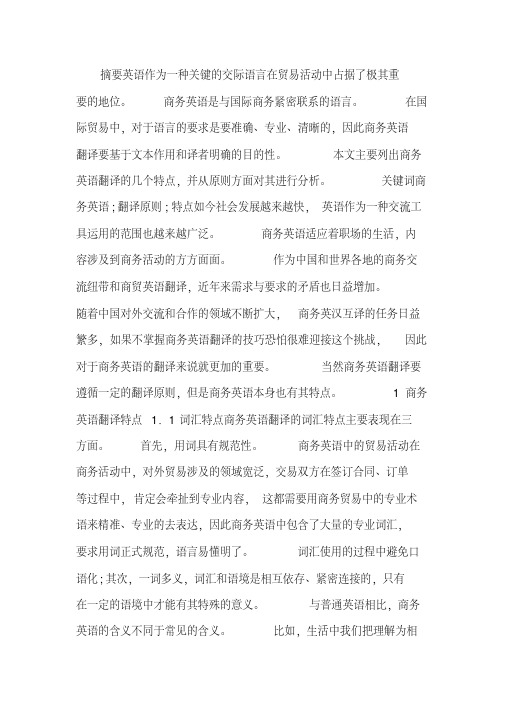
用专业的术语才能做出准确地表达, 符合这个学科的要求, 从而使得
双方在贸易活动中都能了解对方的想法。
此外,商务英语翻译
涉及的都是经贸、 法律等领域, 每个领域都是有其固定的表达和习惯
术语,这就更加需要注意专业术语翻译的准确性。
例如,就不
能按照普通英语的翻译译为提供,而应该翻译成报盘。
术语选
择的准确可以确保文章的整体性。
当然商务英语翻译要
遵循一定的翻译原则,但是商务英语本身也有其特点。
1 商务
英语翻译特点 1.1 词汇特点商务英语翻译的词汇特点主要表现在三
方面。
首先,用词具有规范性。
商务英语中的贸易活动在
商务活动中,对外贸易涉及的领域宽泛,交易双方在签订合同、订单
等过程中, 肯定会牵扯到专业内容, 这都需要用商务贸易中的专业术
[] ; 当代教育论坛学科教育研究 ;2008 年 07 期
将所辖区 域划分 成 ABC 三类 市场, 可概括 为 区别主 次,分 类管理 。它将
管理对 象分为
、 、 三 类,其 关键在
具运用的范围也越来越广泛。
商务英语适应着职场的生活,内
容涉及到商务活动的方方面面。
作为中国和世界各地的商务交
流纽带和商贸英语翻译,近年来需求与要求的矛盾也日益增加。
随着中国对外交流和合作的领域不断扩大, 商务英汉互译的任务日益
繁多,如果不掌握商务英语翻译的技巧恐怕很难迎接这个挑战, 因此
对于商务英语的翻译来说就更加的重要。
例如,
把这句话译成贵方漠视本公司的要求, 如果用这种语气, 对方看到译
文会非常失望,最终不可能达成合作。
但是要译成请贵方注意
本公司的要求, 这样的语气更加有利于维护双方的关系, 使得合作的
浅谈商务英语词汇的特点
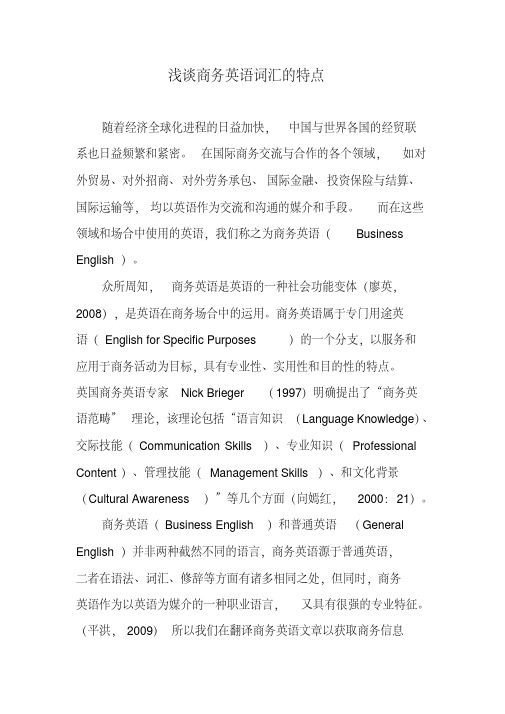
浅谈商务英语词汇的特点随着经济全球化进程的日益加快,中国与世界各国的经贸联系也日益频繁和紧密。
在国际商务交流与合作的各个领域,如对外贸易、对外招商、对外劳务承包、国际金融、投资保险与结算、国际运输等,均以英语作为交流和沟通的媒介和手段。
而在这些领域和场合中使用的英语,我们称之为商务英语(Business English)。
众所周知,商务英语是英语的一种社会功能变体(廖英,2008),是英语在商务场合中的运用。
商务英语属于专门用途英语( English for Specific Purposes)的一个分支,以服务和应用于商务活动为目标,具有专业性、实用性和目的性的特点。
英国商务英语专家Nick Brieger (1997)明确提出了“商务英语范畴”理论,该理论包括“语言知识(Language Knowledge)、交际技能(Communication Skills)、专业知识(Professional Content)、管理技能(Management Skills)、和文化背景(Cultural Awareness)”等几个方面(向嫣红,2000:21)。
商务英语(Business English)和普通英语(General English)并非两种截然不同的语言,商务英语源于普通英语,二者在语法、词汇、修辞等方面有诸多相同之处,但同时,商务英语作为以英语为媒介的一种职业语言,又具有很强的专业特征。
(平洪,2009)所以我们在翻译商务英语文章以获取商务信息时,除了需掌握基本的翻译理论和技巧外,还应具备相关的商务领域的专业知识,如贸易、金融、运输、法律、保险等。
任何一门语言的最基本的单位都是词汇,只有准确理解了词汇的含义才能正确理解语篇的意思,从而准确获取所需的相关信息。
“语言的三大要素是:语音、词汇和语法。
词汇就像大厦的砖,不管什么样的大厦,都是一块一块用砖头砌起来的。
所以,词汇就像语言的最基本的材料,缺不得。
浅析商务英语词汇特点及误译现象
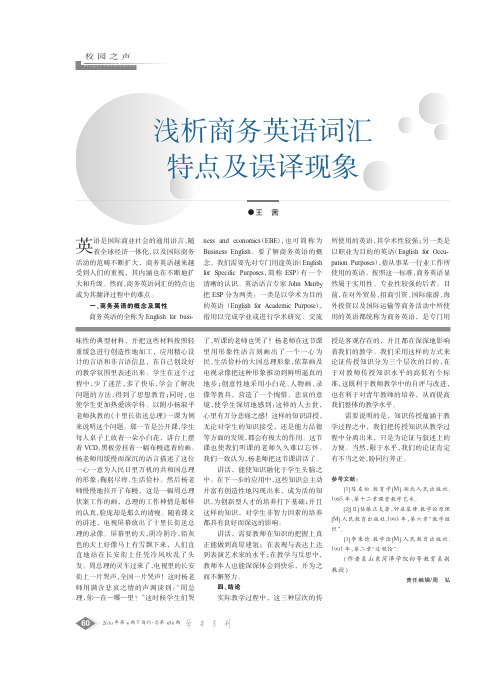
2010年第4期下旬刊·总第454期英语是国际商业社会的通用语言,随着全球经济一体化,以及国际商务活动的范畴不断扩大,商务英语越来越受到人们的重视,其内涵也在不断地扩大和升级。
然而,商务英语词汇的特点也成为其翻译过程中的难点。
一、商务英语的概念及属性商务英语的全称为English for busi-ness and economics(EBE),也可简称为Business English。
要了解商务英语的概念,我们需要先对专门用途英语(Englishfor Specific Purposes,简称ESP)有一个清晰的认识。
英语语言专家John M unby把ESP分为两类:一类是以学术为目的的英语(English for Academic Purpose),指用以完成学业或进行学术研究、交流所使用的英语,其学术性较强;另一类是以职业为目的的英语(English for Occu-pation Purposes),指从事某一行业工作所使用的英语。
按照这一标准,商务英语显然属于实用性、专业性较强的后者。
目前,在对外贸易、招商引资、国际旅游、海外投资以及国际运输等商务活动中所使用的英语都统称为商务英语,是专门用味性的典型材料,并把这些材料按照轻重缓急进行创造性地加工,应用精心设计的言语和非言语信息,在自己创设好的教学氛围里表述出来。
学生在这个过程中,少了迷茫,多了快乐,学会了解决问题的方法,得到了思想教育;同时,也使学生更加热爱该学科。
以附小杨淑平老师执教的《十里长街送总理》一课为例来说明这个问题。
那一节是公开课,学生每人桌子上放着一朵小白花,讲台上摆着VCD,黑板旁挂着一幅布幔遮着的画。
杨老师用缓慢而深沉的语言描述了这位一心一意为人民日里万机的共和国总理的形象:鞠躬尽瘁、生活俭朴。
然后杨老师慢慢地拉开了布幔,这是一幅周总理伏案工作的画,总理的工作神情是那样的认真,脸庞却是那么的清瘦。
随着课文的讲述,电视屏幕放出了十里长街送总理的录像。
商务英语词汇的特点及其翻译
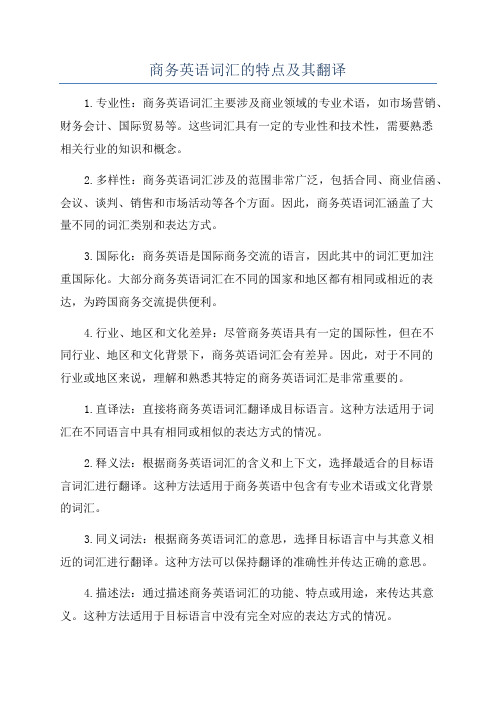
商务英语词汇的特点及其翻译1.专业性:商务英语词汇主要涉及商业领域的专业术语,如市场营销、财务会计、国际贸易等。
这些词汇具有一定的专业性和技术性,需要熟悉相关行业的知识和概念。
2.多样性:商务英语词汇涉及的范围非常广泛,包括合同、商业信函、会议、谈判、销售和市场活动等各个方面。
因此,商务英语词汇涵盖了大量不同的词汇类别和表达方式。
3.国际化:商务英语是国际商务交流的语言,因此其中的词汇更加注重国际化。
大部分商务英语词汇在不同的国家和地区都有相同或相近的表达,为跨国商务交流提供便利。
4.行业、地区和文化差异:尽管商务英语具有一定的国际性,但在不同行业、地区和文化背景下,商务英语词汇会有差异。
因此,对于不同的行业或地区来说,理解和熟悉其特定的商务英语词汇是非常重要的。
1.直译法:直接将商务英语词汇翻译成目标语言。
这种方法适用于词汇在不同语言中具有相同或相似的表达方式的情况。
2.释义法:根据商务英语词汇的含义和上下文,选择最适合的目标语言词汇进行翻译。
这种方法适用于商务英语中包含有专业术语或文化背景的词汇。
3.同义词法:根据商务英语词汇的意思,选择目标语言中与其意义相近的词汇进行翻译。
这种方法可以保持翻译的准确性并传达正确的意思。
4.描述法:通过描述商务英语词汇的功能、特点或用途,来传达其意义。
这种方法适用于目标语言中没有完全对应的表达方式的情况。
无论采用哪种翻译方法,翻译商务英语词汇时需要注意目标语言的语言规范和惯用表达方式,以确保翻译的准确性和流畅度。
同时,也需要充分了解目标受众的语言和文化背景,以便将商务英语词汇的专业意义传达给对方。
商务英语的特点及其翻译

商务英语的特点及其翻译商务英语是指应用于商务场景中的英语语言表达和沟通。
它有一些特点和翻译方法,让我们详细探讨一下。
首先,商务英语的特点之一是正式性。
在商业环境中,人们通常采用正式的语言风格来传达信息和进行交流。
这意味着商务英语的表达方式要更加正式、规范,并且要遵守相应的商业礼仪。
商务英语翻译时,需要对语言进行适当的调整,使其更符合商务的正式性和规范性。
其次,商务英语是一种实用性语言。
商务活动注重高效和实用,因此商务英语也要具备这种特点。
商务英语的表达通常是直接、简洁和准确的,注重传递明确的意思和信息。
在翻译商务英语时,需要确保保留原文中的实用性和准确性,使得译文能够清晰地传达源文的意思。
第三,商务英语注重专业性。
商业领域涉及到各种不同的专业知识和行业术语。
因此,在商务英语中,常会出现一些具有专业性的词汇和表达方式。
在翻译商务英语时,需要具备相关的专业知识,对相关专业术语进行准确的翻译,并确保译文与行业背景相符。
此外,商务英语注重商业文化的理解和运用。
商业活动不仅仅是语言的交流,还包含着特定的商业文化和价值观。
商务英语在表达上也反映了这些文化特点,比如注重礼貌、尊重和信任等。
在翻译商务英语时,需要对商业文化有深入的理解,并在相应的场景中灵活应用。
最后,在商务英语翻译中,重要的一点是要确保准确传达原文的意思。
商务领域注重准确的交流和信息传递,因此在翻译商务英语时,要避免出现歧义、误解或翻译错误。
同时,还要注意上下文的理解和运用,确保译文与原文在语境上的连贯性和一致性。
总的来说,商务英语具有正式性、实用性、专业性和注重商业文化等特点。
在翻译商务英语时,需要考虑这些特点,并保证译文准确地传达原文的意思。
同时,翻译者需要具备相应的专业知识和技巧,才能胜任商务英语翻译的工作。
商务英语词汇的特点及其翻译
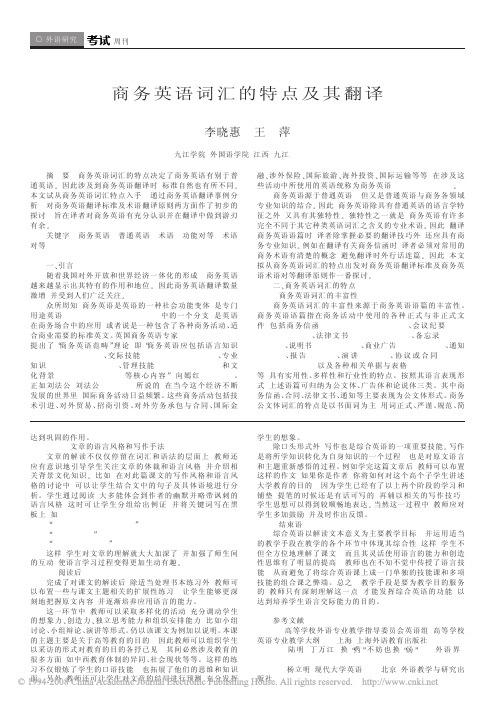
○ 外语Байду номын сангаас究
周刊
商务英语词汇的特点及其翻译
李晓惠 王 萍
( 九江学院 外国语学院, 江西 九江 332005)
摘 要: 商务英语词汇的特点决定了商务英语有别于普 通英语。因此涉及到商务英语翻译时, 标准自然也有所不同。 本文试从商务英语词汇特点入手, 通过商务英语翻译事例分 析, 对商务英语翻译标准及术语翻译原则两方面作了初步的 探讨, 旨在译者对商务英语有充分认识并在翻译中做到游刃 有余。
2. 专业术语词汇数量可观 专业术语是指适用于不同的学科领域或专业的词, 是用 来正确表达科学概念的词, 具有丰富的内涵和外延。专业术语 要求单义性, 排斥多义性和歧义性, 且表达专业术语的词汇都 是固定的, 不得随意更改。商务英语拥有数量可观的专业术语 词汇, 要真正读懂商务英语文章, 译者必须懂得商务英语所涉 及学科领域的相关知识, 避免专业术语词汇普通化, 否则轻则 闹翻译笑话, 重则将造成严重的经济损失。例如: “溢短装”、 “运 费 到 付 ”、“break - bulk vessel”、“direct additional”、“insur- ance certificate”、”空 白 抬 头 ”等 , 从 字 面 上 看 这 些 专 业 词 汇 很 难翻译, 但只要译者具有商务专业知识、了解每个词表达的内 涵, 就非常简单。 可 分 别 译 为 : “more or less”、“freighet to col- lect”、“杂 货 船 ”、“直 航 附 加 费 ”、“保 险 凭 证 ”、“blank en- dorsed”。 再 例 如 下 面 两 句 : 例 ( 1) Just as in that year, when those catastrophes were fol- lowed by substantial increases in insurance premiums, insurers are already lobbying for rate relief.(译 文 : 就 像 那 年 的 情 况 一 样, 大 灾之后保险金大幅度提高, 现在保险公司已经在游说希望减 免地方税。) 例 ( 2) During the 1980’s the large premiums paid in acqui- sition often resulted in prices that greatly exceeded the value of tangible assets .(译 文 : 20世 纪 80年 代 , 并 购 中 支 付 的 大 额 溢 价 常 常 导 致 购 买 价 格 远 远 超 过 有 形 资 产 的 价 值 。)从 上 两 例 又可看出, 商务英语中的同一术语在商务不同领域中又呈 现 不 同 的 词 义 。“premium”在 保 险 业 务 中 , 译 作 “保 险 金 ”, 但 在 销 售 领 域 中 应 译 为 “溢 价 ”。 这 正 是 商 务 英 语 术 语 翻 译 的 难点。 三 、商 务 英 语 翻 译 1. 商务英语翻译标准 由于商务英语使用越来越频繁, 因此商务英语翻译逐渐 引起各家学者的关注。各家学者对商务英语的翻译论述如下 叶玉龙等指出: “对商务英语来说, 翻译标准除‘忠实通顺’外, 还 应 加 上 ‘地 道 ’”。 张新红、李明认为, “商务英语翻译译者除了要精通两种 语言及其文化以及熟悉翻译技巧之外, 还必须熟悉商务方面 的知识, 了解商务各个领域的语言特点和表达法。 ” 常玉田谈到翻译的原则、标准时说 : “翻译的最基本任务 不是转换语言, 而是传达‘意思’、‘信息’和‘内容’, 所以, 商务 英语翻译不同于文学翻译和其它文体的翻译, 它必须强调语 义 对 等 或 等 效 , 做 到 “地 道 ”, 让 读 者 有 专 业 化 的 感 受 , 而 不 是 一般的语言描述。” 专家们的论述见仁见智, 但正如王永泰先生所说的: “翻 译标准不宜苟求全面统一, 应视不同文体而定; 若用‘信达雅’ 来衡量, 则应有区别地有所侧重。”因此, 我们认为: 商务英语 翻译的最高标准是“功能对等”, 即经过翻译, 译文与原文之间 在 信 息 内 容 、信 息 承 载 方 式 、交 际 目 的 和 交 际 效 果 等 方 面 最 大 限度地保持不变。再以严复的“信达雅”三字标准为基础, 参照 刘 法 公 先 生 提 出 的 “忠 实 、准 确 、统 一 ”的 商 务 翻 译 标 准 , 提 出 我们切实可行的商务英语翻译标准应是 “忠实( faithfulness) 、 地 道 ( idiomaticness) 、统 一 ( consistency) ”。 “忠 实 ”是 “功 能 对 等 ”的 必 要 条 件 , “地 道 ”和 “统 一 ”是 “功 能 对 等 ”的 充 分 条 件 。
商务英语语篇的特点及其翻译要点
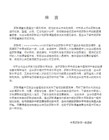
商务英语语篇的特点及其翻译要点1 商务英语语篇的类型及其语篇模式(1)问题解决型(2)直接表述型(3)间接表述型(4)解析型(5)比较——对比型(6)等级型(7)时间发展型(8)空间型(9)主张——反主张型2 商务英语语篇的文体特点2.1 首先,商务英语在进行一般叙述时多使用日常用语,但涉及商贸活动时则大量使用专业词汇和具有商务含义的准商贸术语。
例如:sole license (排他性许可证)Exclusive license (独占性许可证)Counter offer (还盘)Counter suggestion (反还盘)Irrevocable letter of credit (不可撤销信用证)Insurance policy (保险单)Clearance sale (清仓削价销售)2.2商务英语语言灵活且丰富。
不同的词序、介词以及单复数变化都会导致词义发生重大的变化,并给翻译带来一定的困难。
例如:property in goods (货权)property of goods (货物属性) Appearance surface (外表) surface appearance (表面状况)商务英语使用一词多义现象也很丰富,例如:instrument of payment (支付工具)instrument of pledge (抵押契据) instrument of ratification (批准证书) ,instrument of credit control (信用管制手段),instrument of acquisition (购置凭证)。
此外,不同搭配也可能会给理解造成困难,例如:straight B/L (记名提单),direct B/L (直达提单);clean credit (光票信用证),documentary clean credit (无跟单信用证)。
因此,我们在翻译时一定要对原文用词上的细微差别加以认真分析,确保对原文的准确解读,这样才可能产出既忠实又通顺的译文。
商务英语的语言特点及翻译
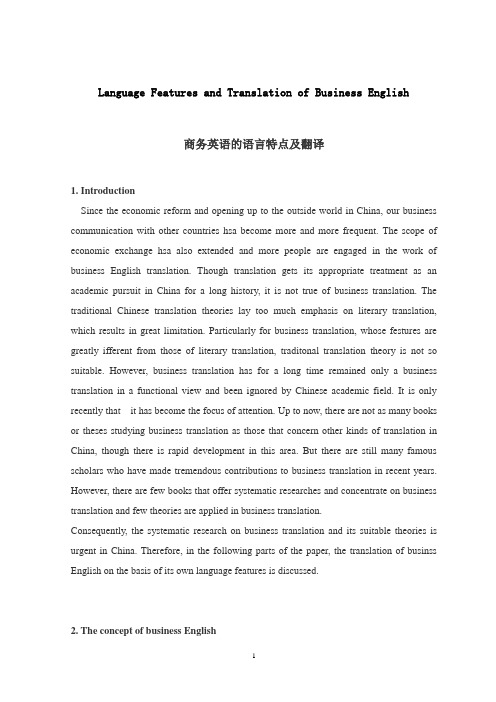
Language Features and Translation of Business English商务英语的语言特点及翻译1. IntroductionSince the economic reform and opening up to the outside world in China, our business communication with other countries hsa become more and more frequent. The scope of economic exchange hsa also extended and more people are engaged in the work of business English translation. Though translation gets its appropriate treatment as an academic pursuit in China for a long history, it is not true of business translation. The traditional Chinese translation theories lay too much emphasis on literary translation, which results in great limitation. Particularly for business translation, whose festures are greatly ifferent from those of literary translation, traditonal translation theory is not so suitable. However, business translation has for a long time remained only a business translation in a functional view and been ignored by Chinese academic field. It is only recently that it has become the focus of attention. Up to now, there are not as many books or theses studying business translation as those that concern other kinds of translation in China, though there is rapid development in this area. But there are still many famous scholars who have made tremendous contributions to business translation in recent years. However, there are few books that offer systematic researches and concentrate on business translation and few theories are applied in business translation.Consequently, the systematic research on business translation and its suitable theories is urgent in China. Therefore, in the following parts of the paper, the translation of businss English on the basis of its own language features is discussed.2. The concept of business EnglishWith the development of the world economy's increasingly globalization, the interactions between China and the rest of the world is becoming more and more frequent. As China's foreign trade constantly forward development, nowaday, our country urgently need a large number of international commercial talents who are mastering foreign languages, understanding the business knowledge, being familiar with international business environment, and being good at cross-cultural communication. Business English is the main communicating language in China's foreign economic activities,which business English plays a role of bridge in this activity. Business English involves marketing, economics, accounting, finance, management science and so on many edge discipline knowledge, and business activities related to foreign trade, technology import, attractting investment, business negotiation, business contract, international business payment and settlement, and foreign insurance scope. Therefore, it is necessary to study the characteristics of business English itself, in order to be accurately regulate use in all fields. Business English is a social function of English variation, is special use a branch of English, English is in business occasions, the application is a contains various business activities suitable for business needs standard English business English to services the business activities as the goal, set practical professional and clear purpose in a body, for international business activities in the people that are identified and accept, and have strong social function of an English variant in today's economic development, international business activities in a world of increasingly frequent, including technology import foreign trade investment promotion foreign service contracting contract and international financial foreign insurance international travel overseas investment international transport business advertising, business activities, all related to the use of English, in all these activities Business English there are two kinds of style, which are formal style and application style. Business style is a style which forms with the production of commodity and the development of trade. The style of business English doesn't pay attention to the beauty of language, but rather stresses the clearity and organization of logic, the accurate rigor of thinking and the preciseness of structure. In the statement, its wording is specific clear andno equivocation. Courtesy is very important in style, which related to the personal accomplishment. Sometimes such little question is the key to success.3. The language features of business EnglishCompared commom English with business English which is a kind of special use language, both of them have similarity in the basic vocabulary, sentence patterns, and the use of grammar, but in specialty vocabulary, language characteristics and other aspects, business English has its own unique features. For this reason, only comprehensive grasp the characteristics of business English language, can people more comprehensive and deep understanding the expression meaning of business English.3.1 Formal and specialized wordingBusiness English involved in business time and business theory and more, and have strong professional. The vocabulary of business English is professional vocabulary, including a large number of professional terms, abbreviations, common words and compound words. Therefore, in the translation of business English , if you want to accurately express information of the original text and let the reader fully understand the original intention, the translator at this time must use the professional standard and equal terms during the ttranslation precess. In addition, when business English is translated, except for the master of two or more than two kinks of languages culture and translation skills, it must be able to manipulate business knowledge, to frequent analyse the context of the content, to master the professional terms of special meaning, more access data and dictionary, and to fundamentally do business English translation well. Because business English is connect with contract and other important documents, Business English is wording rigorous, refined and professional. Therefore, , in order to be accurate, without any deviation, wording must be accurate and precise. In the use of business English, except diction properly, it is necessary to use some inverted sentence, complex sentences, the passive voice and some structure complex clauses to modified sentences and restrictedcontent. Although this makes sentences relatively complex, the meaning is more complete and strict, and won't appear ambiguity when it is read. For example: Pleased to inform you that our counter sample will be sent to you by DHI by the end of this week and confirm it ASAP so that w e can start our mass production (很高兴通知您,我们的回样将于本周末用特快专递给您,请尽快确认,以便我们开始大批生产), in this sentence, "inform" is used as a object, besides the "that" clause and personal pronouns"you", there is a "so that" purpose adverbial clause in the sentence.Business English has a unique vocation characteristic, a highly professional and business terms. For example, in order to reflect the macroeconomic dynamic index, it basically express "国内生产总值(gross domestic product. GDP)" ,"国民生产总值(gross national product, GNP), etc. In the import and export, the term includes "商业发票"(eommereial invoice), "提单"(bill of landing), 汇票(draft/bill of e-ehange) and so on. Therefore, the language form, vocabulary and content of business Englishis is closely related with the profession, which is carrying the information of business practice and theory. In other words, language form, vocabulary, content, etc of business English is decided by its affiliated profession. It is the carrier of business practice, business theory knowledge, so that it must fully understand the meaning and connotation of business English, and equipe the knowledge of business theory and business practices and other aspects.3.2 Strong purpose and objectivityBusiness English is aiming at performing communication tasks, using communicative skills. In the business meeting, making a phone call and discussing the main scene is purposing. In order to see whether business English language applications have reached some kind of purpose, it must have to look at the time and trade which can get better results. In business English, using English on the trade, it lets others act according to the speaker's opinion, thus gets things wanting to get. In addition, in the use of business English, it must be objective, and avoid some personal colour and subjectivity language. According to the objective principle, the process of translation should realize its function for the expected standard. Fpr example, in the business activity of marketing, to achievebusiness promotion is the first principles of advertising translation. This principle decides that the translators should consider the following three factors in advertising translation: language style, readers' reaction and language culture. First of all, advertising translation must follow the advertising language style according to the original language. According to objectivity principle, business advertising translation should meet the target language style of the advertising language style, that is to say the language must be brief, concise, attractive, and try to make the extraordinary language.3.3 Words correct rigorousBecause business English used in international trade, both parties are in different countries or regions, there exists different language and culture differences, if using more complex business English or vocabulary in the trade, it is likely to produce misunderstandings in the trade between both sides. Therefore, in accordance with the relevant provisions of the international trade, the related letters in both sides using as a prat of trade, are certainly prevent by legal. In the process of trade, both parties, except for advertising styles, should ensure accuracy in using other words, and try to choose a single word or relatively simple to replace some abundant meaning words. Thus it makes both trade parties can fully understand the lexical meanings of each other, and ensures smooth completion of the transaction.When people use business English to express ideas, it is more tend to use the easily understanding words, and clear logical relationship to communicate, and use specific language, accurately convey the information to the others. Business English expresses accurate, not exaggerated, the content must be practical and realistic, especially ensure the accurate data and the strict terms. Communicating information should make the lowest limit themisunderstanding, and the less time spend as far as possible. So it is better have clear ideas, strong logic and logical words, such as "as a result", "for this reason". Expression must be concise, especially fax or phone, some familiar idea can use the term to express, in order to avoid redundant.4. Specific principles of and strategies for the translation of business English4.1 faithfulness principle in the translation of business English4.1.1 Faithfulness is the fundamental requirement for business English translation Business English translating is the primitive type of translating,fitting only for the most prosaic matters.To give a good translation the fidelity to the original text is indispensable and is the most essential. Faithfulness can be said to be the prime issue of good translation. As the genius and character of languages ie very different,it has hence become a common opinion, that it is the duty of a translator to attend only to the sense and spirit of his orginal, to make himself perfectly master his author's ideas, and tocommunicate them in those expressions which he judges to be best suited to convey them. In order to constitute a perfect translation, it is requisite that not only the ideas and sentiments of the orginal author should be converyed, but also his style and mannner of writing, which cannot be done whitout a strict attention to the arrangement of his sentences, and even to their order and construction.Tytler describes a good translation to be,that, in which the merit of the original work is so compltely transfused into another language, as to be as distinctly apprehended, and as strongly felt, by a native of the original work. He deduces three laws of translation which the dissertation's writer believes that they also suit business English translation as well. First, that the translation should give a complete transcript of the ideas of the original work. Second, the style and manner of writing should be of the same charavter with that of the original. Third, that the translatiion should have all the case of original composition. The first law reflects the faithfulness principle in trabslation though it suits all kinds of translation.4.1.2 Equivalence of the concept can assure the fidelity to the original text Faithfulness is the highest standard of judging the success of translation. Thus completely understanding the source language and finding equivalent for the original are the preconditions to guarantee the realization of faithfulness. Only when he really understands the essence of the original,can the translator find eqquivalent for the originaltext. In retrospective translation, the target text must be absolutcly faithful to the original text. In retrospective translation, the target text must be absolutely faithful to the original text. And translators need to saiisfy such requirement :1)to understand every word in the original text; 2) to choose the most equivalent word to the originalone; 3) to make the translation as a whole original text's exact equivalent form though tactical arrangement of the equivalent words. The discovery of textual equivalents is based on the authority of a competent bilingual informant or translator.A textual translation equivalent as defined by Catford is thus: that portion of a target language which is changed when and only when a giveen portion of the source language text is changed. Since chinese and English can conwert into cach other easily in replancing the subject, predicate, object, attribute, adverbial, and complement, equivalentss are of the simple eqal-rank and unit-to-unit type. Thus the translation somehow has character of sequential translation.4.2 Exactness principle in the translation of business EnglishThe principle of "exactness" and the application of this principle in business Engliish translation mean that, in the course of transmitting the original language content into the target language content, translators choose correct words, give exact expression, referring to right with the right name, and present accurate figurre and unit. A word or an idiomatic phrase-word, briefly a code-unit, may be fully interpreted only by means of an equivalent combination of code-units, that is, a message feferring to this code-unit:"every bachelor is an unmarried man, and erery unmarried man is a bachelor." Business English translation is connected with translators must not give free expression in translation.For translating leaners, maybe dictionaries are regarded as very useful tools that provide exact explanation of words. But at most times when translating, dictionaries cannot supply exact meaning all along. Translators must be particular about clearness, vividness, and easiness to understand of the translation text. A translator's task is to reveal the original content instead of its form. As the dicitionary is just a tool helpful to better understand the original text,translators must understand the original text with a correct method, that is tosay, starting from the author's point of view. Starting from the translator's angle to read the original work will not produce good translatiion. So translators should sink themselves into the thinking and fiiling if the source work during thorough reading. When metting a word translators shouldn't immediately think of an equialent word in their own mother language. They need to connect the original word with what it stands for.4.3 Consisteny principle in the translation of Business EnglishThe name, concept and term should be always consistent in translation but the consistency principle of business English translatiion to same extent depends on all translators' common errort and the authoritative agent'sunified rules. Some new words often bring trouble to transletors during the initial stage of its usage circulation. It is really not an easy task to decide how to translate these new words is better. The special term from English to Chinese seems easier to keep consistence than that from Chinese to English. When a term translated into Chinese is widely uesd and an increasing number of people come to know it, it becomes a fixed expression. It is easy to keeping consistence in later use of this term because Chinese is our mother tongue and we easily remenber and learn to use new terms. Many of economic knowledge may create new expression for these terms, such as "overwhelming superiority theory","relative advantage theory","original producing place","changeable currency" and so on. To translate general terms in economic field, translators should refer to international English commerce and trade literature, keeping the stability and consistency of the translated names. The general terms of Chinese almost have fixed expression in English, so translators take the responsibility of matching the translated names of the same concept in both languages.The translators of business English must have a good knowledge of business Chinese and business English, and also be familiar with business practice. It is a pity that the false translation of terms is relatively widespread. If the universal English terms are not used, readers of the translation text will not be able understand it, and translators cannot accomplish the task of transmitting messagess.5. ConclusionHaving introduced the theory of functional equivalence, surveyed some issues of business English translation and the language features of it, explored the applicability of functional equivalence and how it is achieved in business English translation, we are now in a position tomake a conclusion of the paper. On one hand, the thesis endeavors to approach business translation in a functional view, which gives a macro basis to the thesis. Based on the survey of theories of functionalists, the thesis proposes that the rule of function plus loyalty could be regarded as a reasonable principle of business translation and offers some convincingreasons. Based on the analysis of this, free translation could be thought as a major strategy for business translation. On the other hand, the thesis explores a systematic analysis of stylistic features of business English, which has great influence on its translation. After an elementary view od the features of business English the thesis analyzes the characteristics of business English, at lexical, syntactic and textual levels, which connect with the principles and atrategy closely. Based on such analysis, two specific principles, exactness and conciseness are put forward, which are directly guided by functional theoryand derived from the features of business English.With the fast development of world economy, business translation has been becoming more and more significant. Meanwhile, it is also a necessary result of the economic development. Business translation must serve for economic development and be testified by the economic needs and further researches are neened and also will be made on this aspect.To sum up, business English is professional, logical, simple, and complexity. So translation of business English is not only needing deep professional knowledge and basic skills of grammar, but also needing more comprehensive understanding of international trade related terms. At the same time, one must understand the problems which oneself exists in the translation process, and translation skills. In the process of translation, it by no means avoids of interpreting without real understanding of meaning, ignoring the details. In the continual development of foreign trade, business English also need to constantly enrich and develop. Only by constantly learning, accumulate experience, the expandedaspect of knowledge, can one make the translation of business English achieve true standardization border.References:[1] CheLiJuan, JiaXiuHai. The business English translation course ". Foreign economic and trade university B version of the club. 2007 (7)[2] ChengHua. The business English translation "(21 century vocational for teaching business English series) tsinghua university press, 2007, (3)[3] Yang light. "college business English translation course" [M]. Beijing: Peking University press, 2005, (5)[4] CuiChangQing, zhang arm bamboo. The business English [m]. China supplies press, 1995, (10)[5] XiaoManJun. "'s understanding of words, choice and business English the translation of "[n]. Chinese translation press, 2000, (1)[6] ZhangYuJin. The business English teaching and translation of understanding "[m]. Xi 'an jiaotong university press, (3), 2003[7] dream episode, sensitive. "modern business English translation strategy" [n]. Chinese translation for science and technology, 2005 (6)[8] LiYuXiang. "talk about business English language characteristics and translation" [n]. Jiangxi normal university press, 2005, (7)11。
浅谈商务英语的特点及翻译技巧-精品教育文档
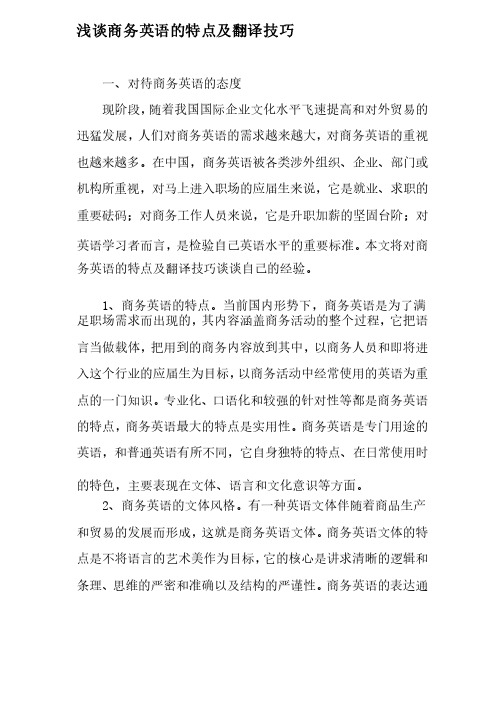
浅谈商务英语的特点及翻译技巧一、对待商务英语的态度一、对待商务英语的态度 现阶段,随着我国国际企业文化水平飞速提高和对外贸易的迅猛发展,人们对商务英语的需求越来越大,对商务英语的重视也越来越多。
在中国,商务英语被各类涉外组织、企业、部门或机构所重视,对马上进入职场的应届生来说,它是就业、求职的重要砝码;对商务工作人员来说,它是升职加薪的坚固台阶;对英语学习者而言,是检验自己英语水平的重要标准。
本文将对商务英语的特点及翻译技巧谈谈自己的经验。
务英语的特点及翻译技巧谈谈自己的经验。
1、商务英语的特点。
当前国内形势下,商务英语是为了满足职场需求而出现的,其内容涵盖商务活动的整个过程,它把语言当做载体,把用到的商务内容放到其中,以商务人员和即将进入这个行业的应届生为目标,以商务活动中经常使用的英语为重点的一门知识。
专业化、口语化和较强的针对性等都是商务英语的特点,商务英语最大的特点是实用性。
商务英语是专门用途的英语,和普通英语有所不同,它自身独特的特点、在日常使用时的特色,主要表现在文体、语言和文化意识等方面。
的特色,主要表现在文体、语言和文化意识等方面。
2、商务英语的文体风格。
有一种英语文体伴随着商品生产和贸易的发展而形成,这就是商务英语文体。
商务英语文体的特点是不将语言的艺术美作为目标,它的核心是讲求清晰的逻辑和条理、思维的严密和准确以及结构的严谨性。
商务英语的表达通常都是淡于修饰、明白易懂,一般不会用到夸张、比喻和拟人之类的修辞手法,这样做的目的是为了提高英语翻译过程的时效性。
商务英语在翻译时要注意尽量避免沉冗老旧的商业套话和术语,要尽可能的使用简单易懂的现代英语表达。
在叙述某件事物时,商务英语的表达通常都会做到具体而明确,绝不会笼统的一概而论或者打马虎眼。
在国际商务英语的使用时还有一个重要的特点就是措辞礼貌,而在汉语中就显得缺少必要的客气,礼貌用语一般只经常见到一个“请”字。
商务英语中则要多很多表达,比如常见的就有“We would be glad to??”“We would appreciate”“It would be appreciate”等表达方法。
商务英语的语言特点
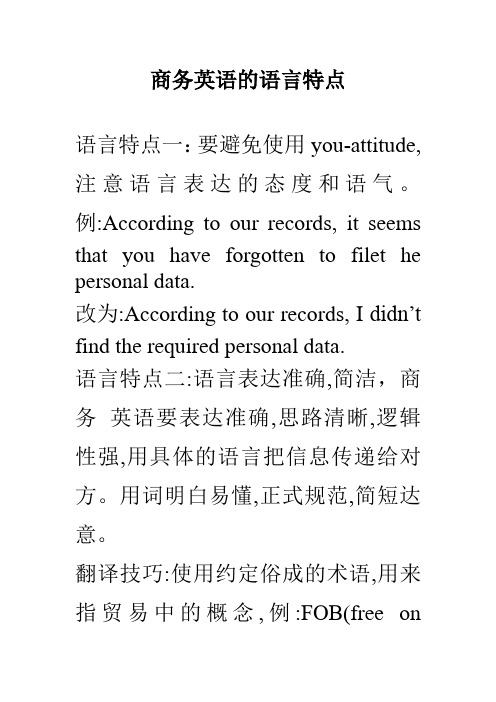
商务英语的语言特点语言特点一:要避免使用you-attitude,注意语言表达的态度和语气。
例:According to our records, it seems that you have forgotten to filet he personal data.改为:According to our records, I didn’t find the required personal data.语言特点二:语言表达准确,简洁,商务英语要表达准确,思路清晰,逻辑性强,用具体的语言把信息传递给对方。
用词明白易懂,正式规范,简短达意。
翻译技巧:使用约定俗成的术语,用来指贸易中的概念,例:FOB(free onboard-离岸价格),CFR(cost and freight—成本.保险加运费)避免使用冗长的表达。
例:All applicants who are interested in the job are obligated to provide the names of three references whom we can write to for evaluation of your job performance.改为:All applicants are supposed to provide three references for evaluation of your job performance.语言特点三:专业性强。
商务英语大量使用专业术语。
因此要充分理解商务英语的意义和内涵,必须有商务理论和商务实务等方面的知识。
翻译技巧:掌握专业术语,并注意术语在具体语境中的运用,例一:The seller should present the following documents required for negotiation to the banks.句中和的negotiation应译为“议付”,而不是常用意思“谈判”。
商务英语词汇的特点及翻译
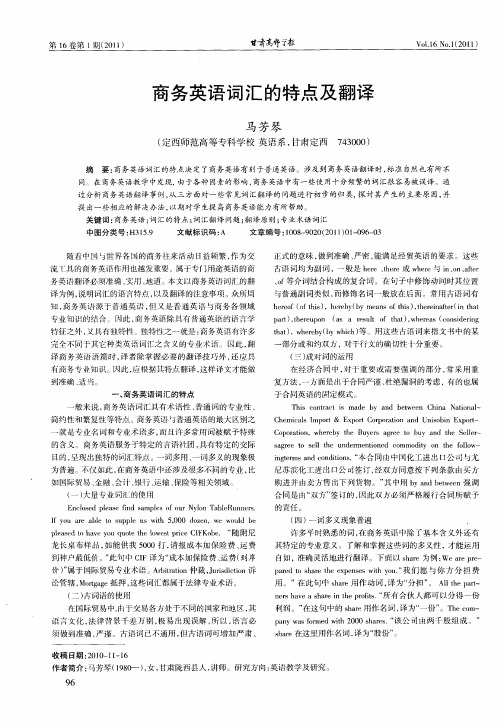
正式的意味 , 到准确 、 做 严密 , 能满足经贸英语 的要求 。这些
古语词均为 副词 , 一般是 h r t r ee、 ee或 w e h h r i 、n ae e与 n o 、 r t f
、
o 等介词结合构成的复合词 。在句子 中修饰动词时其 位置 f
与普通副词类似 , 而修 饰名词一般放在后面。常用古语词有
第1卷 期( 1) 6 第1 2 01
甘 .椎 音高 亍 坪
V1 .2 1 o1N 1 0 ) . o( 1 6
商务英语词汇 的特点及翻译
马 芳琴
( 定西师范高等专科学校 英语系 , 甘肃定西
摘
73 0 ) 4 00
要: 商务英语词 汇的特点决定 了商务英语 有别于普通英语。涉及到 商务英语翻译时 , 标准 自然也有所不
En ls d p e s n a l so u y o a l Ru n r . co e l a e f d s mp e f o r N ln T b e n e s i I y u a e a l o s p l U t , 0 o e ,we wo l e f o r be t u p e S wi 50 0 d z n h ud b
关键词 : 商务 英 语 ; 汇 的 特 点 ; 汇翻 译 问题 ; 译 原 则 ; 业术 语 词 汇 词 词 翻 专
中图分 类号 : 3 59 H 1.
文献标识码 : A
文章编号 :0 8 9 2 (0 10 — 9 — 3 10 — 0 0 2 1 ) 10 6 0
随着中囤 L世界各国的商务往来活动 日益频繁 , I j 作为交 流 具 的商 务英语作用也越发重要 。属于专门用途英语 的商 务英语翻译必须 准确 、 实用 、 地道。本文以商务英语词汇 的翻 译为例 , 说明词汇的语 言特点 , 以及翻译 的注意事项 。 众所周
商务英语词汇的翻译特点及实例分析
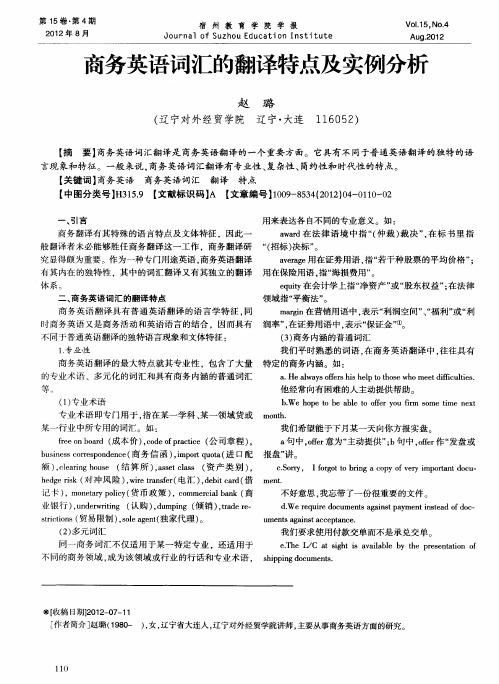
21 0 2年 8月
宿 州 教 育 学 院 学 报
d m 1 ou Ra of S zh d a o n t1 t u ou E uc t n I s tu e
Vo . 5, . 1 1 No 4
Au 2 g.01 2
商务英语词汇的翻译特点及实例分析
() 2 多元 词汇
我们要求使用付款交单 而不是承兑交单。
eT e L C a ih s a alb e b h r s nain o .h / t sg ti v i l y t e p e e tto f a
s i pn o u n s h p i gd c me t .
【 关键词】 商务英语 商务英语词汇 翻译 特点 【 中图分类号】 35 【 H 1. 文献标识码】 【 9 A 文章编号109 83 (020— 10 0 10 — 542 1 )4 0 1— 2
一
、
引 言
用来 表达 各 自不 同的专业 意 义 。如 :
商 务 翻译 有 其 特 殊 的语 言 特 点及 文 体 特 征 ,因此 一
( 决 。 般翻译者未必能够胜任商务翻译这一工作 ,商务 翻译研 “招 标 ) 标 ”
究显得颇为重要 。作为一种专 门用途英语 , 商务英语翻译
体系。
二、 商务 英 语词 汇 的翻 译特 点
有 其 内在 的独 特 性 ,其 中 的词 汇 翻译 又有 其 独 立 的 翻译 用在 保 险用 语 , “ 损 费用 ” 指 海 。
我们希望能于下月某一天向你方报实盘。
f e n or 成本价)cd pat e( r ad( eob ,oe f r i 公司章程 ) o cc , a 句中, e 意为“ o r f 主动提供 ”b句中,fr 发盘或 ; oe 作“ f bs es o epnec ( ui s cr sodne 商务信 函 )ipaqo ( 口配 报盘 ” n r , o t 进 m ua 讲。 额 )c a n os ( 算所 )ast l s ( ,l r g ue 结 ei h ,s a e c s 资产 类别 ) ,
商务英语的词汇特征及其翻译
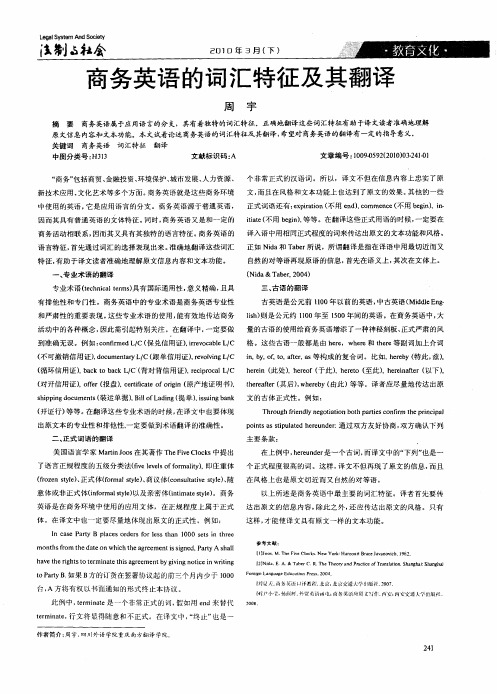
{占 l 枉会 ; J
21年 月 下 11 3 ( ) :3 1
商务英 语 的词 汇特 征及 其翻 译
周 宇
摘 要 商务 英语属 于应 用语 言的分 支,其 有着 独特 的词 汇特征 。正 确地翻译 这 些词 汇特 征有 助 于译 文读 者准 确地理 解 翻译
主 要 条款 :
美 国语 言学 家 Ma i Jo 在其 著作 T e i C o k 中提 出 tn o s h Fv l s e c
在 上例 中 , e u d r h r n e 是一 个古词 , 译文 中的“ e 而 下列” 也是一
( 开信用 证) of ( 对 , f r 报盘 )c r f a f r i 原产 地证 明书 ) t ra e ( 后)w eey( e , et c t o i n( i e og i , h ef r 其 e t , hr b 由此 ) 等等 。译者 应尽 量地传 达 出原 sip g o u e t ( 运单据 ) i o a i ( 单)i u g a k 文 的古体 正式性 。例 如 : h i c m ns 装 p nd , l f d g提 Bl L n ,s i n snb ( 开证 行) 等 。 等 在翻 译这 些专业 术语 的时 候, 译文 中也要 体现 在 出原文 本 的专业 性和 排他性 , 一定要 做到 术语翻 译 的准 确性 。
“ 商务” 括商 贸 、 包 金融投 资 、 境保护 、 环 城市 发展 、 力资源 、 人
而且 在风格 和文 本功 能上 也达到 了原 文 的效果 。 其他 的~ 些 新 技术应 用 、 化 艺术等 多个方 面 。 文 商务 英语就 是这 些商 务环境 文 , 中使 用 的英语 , 是应 用语言 的分 支 。商务英 语源于 普通 英语 , 它
商务英语有哪些翻译方法

商务英语有哪些翻译方法〔商务英语〕的翻译方法有:顺序翻译、反向翻译、词义引申翻译法、细化翻译法,这些方法既能正确再现原文内容,又能确保翻译通顺、表达准确、句子通顺。
1.顺序翻译顺序翻译法是按照原文的顺序组织译文。
在商务英语中,当句子陈述一系列动作,并按照时间或逻辑关系排列时,这样的句子与汉语表达方式更一致。
可以按照原文的顺序翻译。
2.反向翻译英汉两种语言结构有很大的差异。
英语重在前面,汉语重在后面,汉语长句采纳总结形式,把更多的信息点放在后面,就更重要。
如果一个句子既有表达又有陈述,汉语会把表达部分放在第一位。
在英语中则相反,陈述部分往往放在句首,翻译成汉语时放在句尾,从而形成反译。
3.词义引申翻译法词义引申的翻译方法是依据上下文的内在联系,通过句子中的词或短语乃至整个句子的字面意义,由表及里,运用一些符合汉语习惯的表达方式,选用确切的汉语词句,准确地表达原文内容的实质。
从词义的角度看,引申可分为抽象引申和具体引申。
从句法角度看,引申可以分为逻辑引申、语法引申、修辞引申和概念范围引申等。
对词义的概括和引申,是指将原文中一些字面意义具体的词语,用汉语中抽象概括的词语来表达。
4.细化翻译法商务英语中有些句子结构复杂,信息量大,单靠一种方法很难翻译到位。
在翻译这类句子时,要依据具体状况,明确修饰语与中心词的关系以及修饰语内部各成分之间的关系。
综合运用和灵活处理各种方法,既能正确再现原文内容,又能确保翻译通顺、表达准确、句子通顺。
在语言特征上,英语是形合意不合,汉语是意合形不合。
2 商务英语如何进行翻译一.转换句子1.在发音方面,将主动语态改为被动语态,或将被动语态改为主动语态。
2.在词性方面,用介词、形容词、副词、名词代替原动词,用动词、形容词、代词代替名词,用短语、副词代替形容词。
3.造句时,用谓语、定语、状语、宾语代替主语,用谓语、主语、定语改谓语,或用主语、状语改定语。
4.在句型方面,可以将简单句与复句互换,也可以将复句与复句互换,或将定语从句转换为状语从句。
第二节(商务英语语言特点及翻译技巧)1
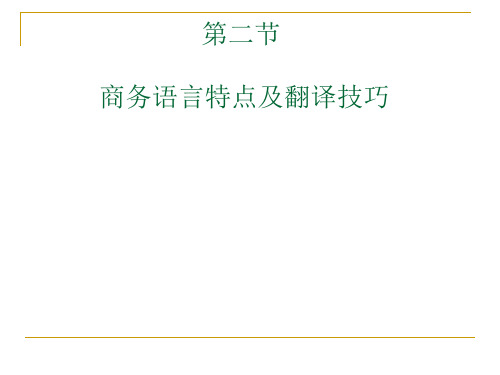
Sec8
返回
一、商务英语的语言特点(1)
Sec 1 Sec 2 Sec 4 Sec 6 Sec 7 Sec8 返回
1. 专业术语丰富
作为专门用途英语,商务英语与商务活动密切相关,承载着对外贸 易和国际商务等方面的信息交流,其突出特点就体现在专业术语的大量 运用。例如:
The distributor agrees to accept, on presentation, and to pay with exchange, sight draft against bill of lading attached。
返回
一、商务英语的语言特点(5)
Sec 1 Sec 2 Sec 4 Sec 6 Sec 7
4. 程式化的套语运用广泛 为了提高信息往来的效率和促进商务活动的时效性,商务英语在长期的实践中 形成了各种固定的程式化套语。这既是商务英语句法有别于其他语体的一个显著的 特点,又是进行商务英语翻译的一个突破口和着眼点。例如:
Sec 1
二、商务英语翻译的原则(1)
商务英语翻译同普通英语翻译或者文学翻译有很大的区别,译者除了
Sec 2 要有扎实的双语基本功和熟练的翻译技巧,还必须具备丰富的商务专业知 识,了解商务各个领域的语言特点和表达法。
Sec 4
Sec 6
Sec 7
Sec8
返回
二、商务英语翻译的原则(2)
Sec 1 Sec 2 Sec 4 Sec 6 Sec 7 Sec8
Sec8
返回
例如 Balance 和 Insurance policy 的正确的译文是 银 行余额 保险单
more or less clause 在国际贸易中译为 溢短装条款。
10商务英语词汇特点及翻译策略
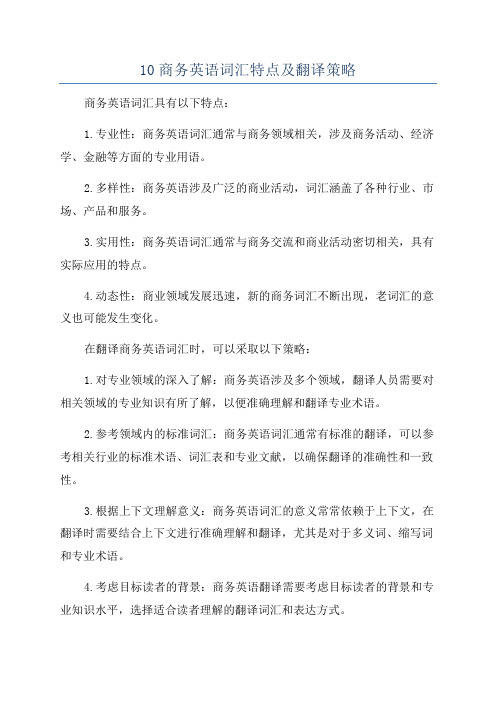
10商务英语词汇特点及翻译策略
商务英语词汇具有以下特点:
1.专业性:商务英语词汇通常与商务领域相关,涉及商务活动、经济学、金融等方面的专业用语。
2.多样性:商务英语涉及广泛的商业活动,词汇涵盖了各种行业、市场、产品和服务。
3.实用性:商务英语词汇通常与商务交流和商业活动密切相关,具有实际应用的特点。
4.动态性:商业领域发展迅速,新的商务词汇不断出现,老词汇的意义也可能发生变化。
在翻译商务英语词汇时,可以采取以下策略:
1.对专业领域的深入了解:商务英语涉及多个领域,翻译人员需要对相关领域的专业知识有所了解,以便准确理解和翻译专业术语。
2.参考领域内的标准词汇:商务英语词汇通常有标准的翻译,可以参考相关行业的标准术语、词汇表和专业文献,以确保翻译的准确性和一致性。
3.根据上下文理解意义:商务英语词汇的意义常常依赖于上下文,在翻译时需要结合上下文进行准确理解和翻译,尤其是对于多义词、缩写词和专业术语。
4.考虑目标读者的背景:商务英语翻译需要考虑目标读者的背景和专业知识水平,选择适合读者理解的翻译词汇和表达方式。
5.不断学习和更新:商务领域发展迅速,新的商务词汇不断涌现,翻译人员需要继续学习和更新知识,以保持对商务英语词汇的准确理解和翻译能力。
商务英语中翻译的方法
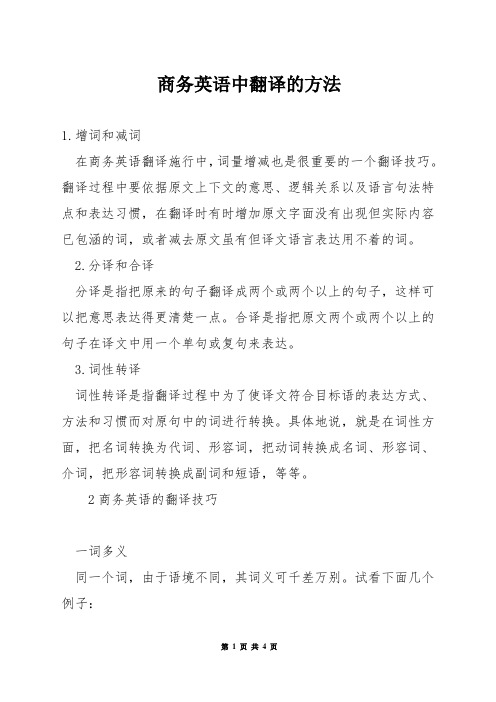
商务英语中翻译的方法1.增词和减词在商务英语翻译施行中,词量增减也是很重要的一个翻译技巧。
翻译过程中要依据原文上下文的意思、逻辑关系以及语言句法特点和表达习惯,在翻译时有时增加原文字面没有出现但实际内容已包涵的词,或者减去原文虽有但译文语言表达用不着的词。
2.分译和合译分译是指把原来的句子翻译成两个或两个以上的句子,这样可以把意思表达得更清楚一点。
合译是指把原文两个或两个以上的句子在译文中用一个单句或复句来表达。
3.词性转译词性转译是指翻译过程中为了使译文符合目标语的表达方式、方法和习惯而对原句中的词进行转换。
具体地说,就是在词性方面,把名词转换为代词、形容词,把动词转换成名词、形容词、介词,把形容词转换成副词和短语,等等。
2商务英语的翻译技巧一词多义同一个词,由于语境不同,其词义可千差万别。
试看下面几个例子:1.They cannot obtain credit at all in the trade.他们生意信誉已荡然无存。
2.They have opened the covering credit with the Bank of China,London.他们已从伦敦中国银行开立了有关信用证。
词义引伸商务英语翻译有时会有在英语在线翻译词典上找不到切合语境的具体释义的状况。
这时必须捋顺上下文逻辑关系,从该词本身进一步加以引伸。
例如:We have an interest for your athletic goods.如果将interest这个词的词义直接放入译文,显然不能正确表达原文的意义,所以必须要进一步的引申。
词类转译词类转译是国际商务翻译中常见的译词技巧。
常见的有名词与动词、介词与动词的互相转译。
1.名词与动词的互相转译:Before the payment of these tariffs, the imported goods will be in the custody of the customs.交关税前,进口货物由海关保管。
商务英语翻译特点

理解本地商业规则,适应市 场需求和商业模式。
团队合作
在多元文化团队中进行翻译 工作。
处理商业信息的能力
1
信息分析
能够理解并准确处理商业信息。
2
数据解读
通过分析数据,提供准确的商业翻译。
3
信息转化
将商业信息转化为易于理解的翻译结果。
语言和写作要求
用词选择
精挑细选用词和语法, 使翻译更流畅和自然。
语言表达
要求高的语言能力和写 作水平。
语感重要
准确把握目标语言的语 感和表达方式。
翻译纷争和解决方法
1 专业沟通
与客户和相关方保持 专业和透明的沟通。
2 纠错能力
快速发现错误并提供 准确的翻译纠正。
3 妥协和解决
能够灵活处理并解决 翻译纠纷。
商业惯例
了解商业行业的惯例和常规,确保翻译符 合实际。
本土化
要求对目标语言的当地文化和风俗有深入 了解。
翻译精准性和准确性
1 专业素材
2 术语使用
储备专业性强的翻译素材和参考资料。
正确识别和运用领域内的专业术语。
3 总结和归纳
能够准确概括细节,表达核心意思。
追求本土化
文化适应
商业规则
将翻译结果与本地文化融合, 符合当地习俗和习惯。
商务英语翻译特点
商务英语翻译特点
语言专业性强
1 专业词汇
2 技术要求
3 学科门类广泛
要求准确理解和翻译 商业术语和行业背景。
翻译需要精准准确, 注重语法和写作能力。
需要了解多个学科领 域的术语和知识。
误解。
商业场景
理解商业环境和行业背景,使翻译更准确。
- 1、下载文档前请自行甄别文档内容的完整性,平台不提供额外的编辑、内容补充、找答案等附加服务。
- 2、"仅部分预览"的文档,不可在线预览部分如存在完整性等问题,可反馈申请退款(可完整预览的文档不适用该条件!)。
- 3、如文档侵犯您的权益,请联系客服反馈,我们会尽快为您处理(人工客服工作时间:9:00-18:30)。
论家亚历山大 ・ F・ 泰特勒也 提出翻译 的三大标 准 :一是翻 译应完全复写 出原作 的思想 ; 二是风格和写作方 式应与原
作的风格和写作方式 具有 同样 的特点 ; 三是译 文应 保 留原 作的流畅 自如 。r z q 叶玉龙也指 出 : 对 商务英语来说 , 翻译标
准除忠实通顺外 , 还应加上地道 。所谓地道 , 就是译文体现
中 图分 类号 : H3 1 5 . 9 文 献标 识 码 : A 文章 编 号 : 1 0 0 8 — 9 0 0 4 ( 2 0 1 5 ) 0 8 — 0 0 9 7 — 0 2
商务英语词汇的特点有很多 ,除了具有 日常英语词汇 的一般特点之外 。 还具有 自身的特点。第一 , 术语性 。商务 英语 是一种应用型语 言 , 它 涉及范 围广 , 专业性 强 , 在各个 领域都有 自己的专业术语 。如 : 国际商 贸行业 的远期 汇票 : t e r m b i l l , 离岸价 : F r e e o n B o a r d ; 经济行业 的公 司章程 : c 0 卜 p o r a t e c h a r t e r , 资本货 物 : c a p i t a l g o o d s ; 金融 行业 的外汇 市 场: f o ei r g n e x c h a n g e m a r k e t , 浮 动 汇率 : l f o a t i n g e x c h a n g e r a t e ; e t c . 第二 ,简 洁性 。简洁是商务英语最显著 的语 言特 点, 它力求用 最简洁明 了的词语 或句子来 表达最准确 的意 思, 以防信息 过多而造 成语 意 的含 糊不 清 。例 如 : 运费 到 付: F ei r g h t f o r w a r d ; 尚未交付的订单 : B a c k l o g o f o r d e r . 为了
第2 2卷 第 8 期
Vo I . 2 2 No . 8
鄂
州
大
学
பைடு நூலகம்
学
报
2 0 1 5年 8月
Au g . 2 0 1 5
J o u r n a l o f Ez h o u Un i v e r s i t y
论 商务英语词 汇 的特点及 其翻 译方法
李明璐
( 香 港 浸 会 大 学, 中国 香港 9 9 9 0 7 7 )
语再现语源 的信息 。 ” 睇 二, 统一性 原则 。 在进行商务英语 的翻译过程 中要采用统一的译名 术语和概念 , 不能随意更
p a r t i e s h e et r o . 这句 话 中用 冷僻词 “ t e r mi n a t e ”替 代 了常 用 词“ e n d ” . 第四, 灵活性。 英语词汇通常具有几个意思 , 除了
出商务英语 的特色 , 遣词造句说 的是 内行话 , 符合商界的习
惯表达 。 专家们对商务英语 的翻译都有独到的见解 , 归纳 起来 就是 把英语语言知识 与商务知识结合起 来 , 准 确地传 达原文 的意义 , 保证译文表达专业 、 地 道。[ 4 1 商务英语词汇 的翻译应遵循 以下原则 : 第一 , 准确性原 则 。在进行商务文本的翻译过程 中 , 要遵循准确性 原则 , 它 要求概念表达确切 、 数码 与单位精确 、 物 与名所指正确 。这 主要表现在两个方面 , 一是语言结构上的准确性 ; 二是专业 风格上 的准确性 。语言结构上的准确性要求在翻译商务英 语词 汇时 , 要用 词精准 、 行 文通畅 、 语 言表达 符合规 范等 。
具有 本义之 外 , 在不 同 的语 境 中还 被赋 予新 的含 义 , 在 翻 译 的过程 中具有很大 的灵活性 。例如 : “ c o v e r ”作名词 时是 指“ 盖子、 掩 蔽物 ” , “ 封皮、 封盖 ” , 用在 与保 险相关 的领域
改。例 ̄ l l : M i c e r s o f t ( 微软) ; N o k i a ( J /  ̄ 基亚) ; D e l l ( 戴尔) 等为人 们所熟悉和普遍接受的译名 , 在翻译时不能随意更 改 , 应遵
mi n a t e u p o n t h e b a n k r u p t c y o r i n s o l v e n c y o f e i t h e r o f t h e
专业风格上 的准确性主要通过商务文本特有 的专业术语和
某些 特殊 的表达形式来体 现 , 在 翻译 过程 中应根据不 同的 语境 , “ 从语义到文本在译语 中用 最贴切而 又最 自然 的对等
摘
要: 商务英语是一种应用性语 言 , 具有很 强的实用性和专业性。 近年 来商务英语的应用 范围越来越广泛, 商务英语翻
译 的需求也显著增加 , 这就对翻译 的质 量有 了更高的要 求。商务英语的翻译要遵循 准确性原则和统一性原则 , 依据语境选择
恰 当 的词 语 进 行 翻 译 。
关键词 : 商务英语 ; 词汇特点 ; 翻译 方法
家至商家 。 第三 , 书面性 。 在公文 、 合同、 条约和法律文件 等 正式 商务文 本 中 , 通 常要用 书面词 语来 表述意 思 , 以彰 显 严 肃和 庄重 。例 如 : r r h e A g r e e m e n t s h a l l a u t o m a t i c a l l y t e r -
语 言的简 洁 , 同时也 为 了提 高效率 , 商务英语 中会 运用 大 量 的缩 略词 , 这 些缩略词是 由主干单词 的首字母组成 。例
如: AM: A me n d m e n t 修改书 ; B 2 B : B u s i n e s s t o B u s i n e s s商
